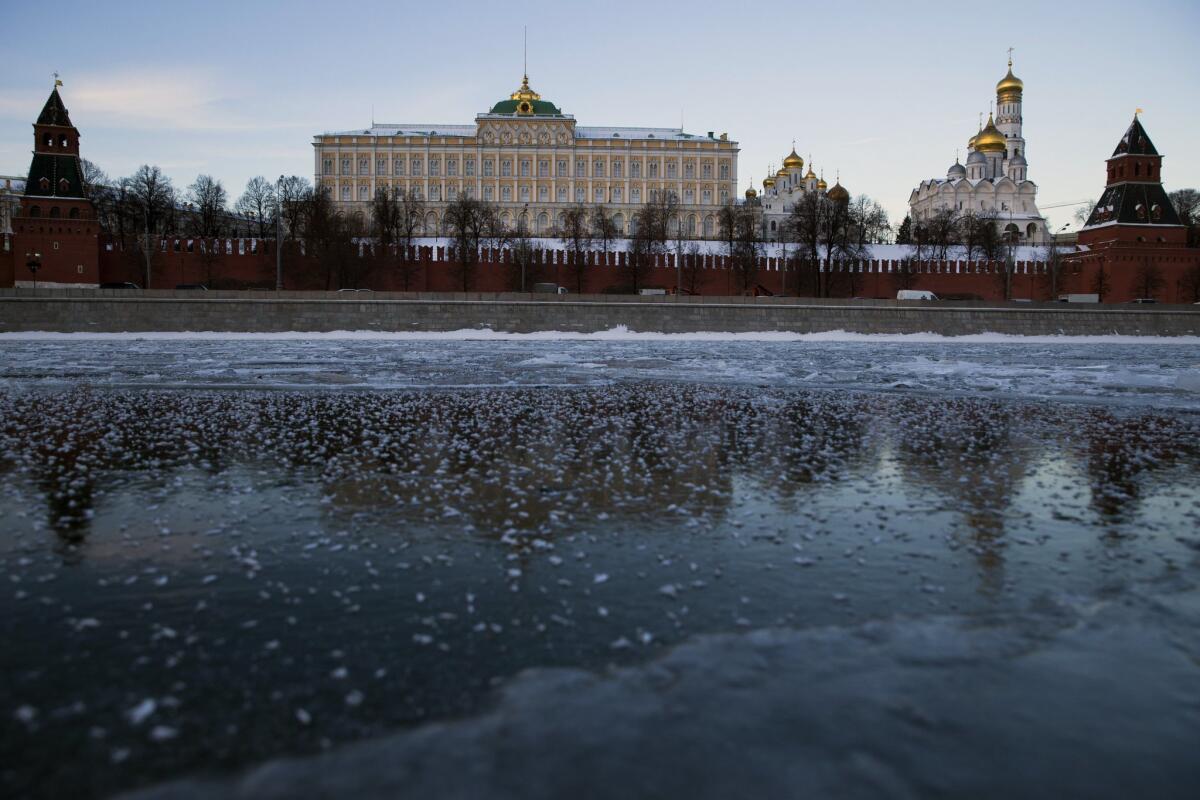Russia threatens to halt cooperation with U.S. on Iran, Syria

- Share via
Reporting from Washington — Russia warned Tuesday that it may halt cooperation with the United States on Iran and Syria in response to a continuing stream of U.S. sanctions.
One day after the Obama administration announced its latest penalties, the Russian Foreign Ministry spokesman, Alexander Lukashevich, said the sanctions “are putting in doubt prospects for bilateral cooperation on solving the situation around the Iranian nuclear program, the Syrian crisis and other acute international problems.”
“As Washington could have seen previously, we don’t leave such unfriendly acts without an answer,” he said in a statement in Moscow.
The State Department announced Monday it was penalizing four Russian officials under the so-called Magnitsky Act for alleged human rights abuses.
It imposed visa bans and asset freezes on two Russian officials allegedly involved in covering up the death of Sergei Magnitsky, an activist lawyer who had claimed widespread corruption in the Russian government. The same penalties were also imposed on two other officials who were allegedly implicated in the kidnapping and torture of Chechen human rights activist Ruslan Kutayev.
The 2012 law was intended to punish Russian officials responsible for the death of Magnitsky. It also was aimed at punishing other alleged gross human rights abuses by Russian officials.
On Dec. 18, President Obama signed legislation aimed at punishing the Russian defense, energy and banking industries in response to Moscow’s seizure of Ukraine’s Crimea region last spring and Russian military support for separatists in the country’s eastern region.
The legislation also authorizes the administration to provide Ukraine’s government with $350 million in arms for its struggle against the separatists.
The U.S. government announced sanctions against Russian individuals and organizations five times previously this year in response to Russian actions in Ukraine.
A senior State Department official, speaking on condition of anonymity to discuss internal deliberations, said Monday that Moscow was likely to react in some way to the latest sanctions, and might retaliate.
“We are aware of retaliation they have taken … throughout this year in response to other sanctions,” the official said in a briefing on the latest penalties.
Moscow has continued to cooperate with the Obama administration in the negotiations over Iran’s controversial nuclear program. It has many reasons to continue that cooperation, since it wants a role in the high-profile talks, and wants to expand its lucrative civil nuclear relationship with Tehran.
But Russia has leverage to frustrate U.S. goals in the talks between Iran and six world powers. It is more important to the Obama administration than to the Kremlin to have the talks end in a comprehensive deal that curbs Iran’s nuclear program in exchange for easing of economic sanctions.
The latest sanctions have come at a delicate moment in U.S.-Russian relations.
While Russian President Vladimir Putin does not want to be seen bowing to Western pressure, many officials and analysts believe he may want to reduce tensions with the West to ease the economic pressure on his government from the recent sharp decline in oil prices and the effects of accumulating Western sanctions.
“He may realize his interests are better served by a better relationship with the U.S.,” a senior administration official said in a recent interview. He spoke on condition of anonymity because he was not authorized to speak publicly about the diplomatically sensitive issue.
Follow @RichtPau for more coverage of international affairs
More to Read
Sign up for Essential California
The most important California stories and recommendations in your inbox every morning.
You may occasionally receive promotional content from the Los Angeles Times.














